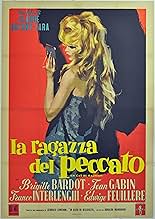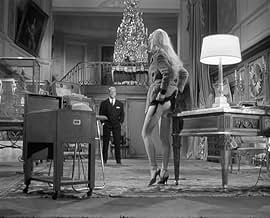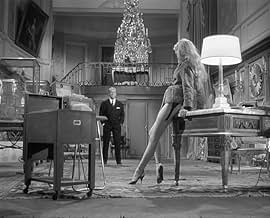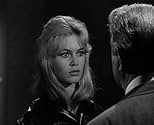IMDb-BEWERTUNG
6,7/10
1732
IHRE BEWERTUNG
Der verheiratete französische Anwalt Andre verteidigt erfolgreich den Fall von Yvette, die einen Raubüberfall begangen hat. Er verliebt sich in sie, aber sie ist ihm nicht treu.Der verheiratete französische Anwalt Andre verteidigt erfolgreich den Fall von Yvette, die einen Raubüberfall begangen hat. Er verliebt sich in sie, aber sie ist ihm nicht treu.Der verheiratete französische Anwalt Andre verteidigt erfolgreich den Fall von Yvette, die einen Raubüberfall begangen hat. Er verliebt sich in sie, aber sie ist ihm nicht treu.
- Auszeichnungen
- 1 Nominierung insgesamt
Georges Seey
- Le bijoutier
- (as Georges Scey)
Empfohlene Bewertungen
The film under review closes off nicely Claude Autant-Lara's impeccable 15-year run of noteworthy pictures that had begun with 1943's DOUCE (see my upcoming rave review); it is also notable for being an unlikely but fairly successful meeting between the biggest (Jean Gabin) and hottest (Brigitte Bardot) stars in French Cinema at the time i.e. just before the outbreak of the "Nouvelle Vague" brought along a horde of fresh and irreverent talent. Adapted from a Georges Simenon novel, the plot of EN CAS DE MALHEUR is quite predictable and not entirely convincing but the consummate professionalism of all concerned smooths over any bumps that come up along the way. Bardot is an aimless youth who, together with her reluctant girlfriend, amateurishly attempts to pull off a small-time jewel heist that, inevitably, goes wrong and, eventually, picks up Gabin's name at random from a phone book to act as her defense counsel in court; not having the financial means to pay for his services, she elects to remunerate him in the only way she knows how: seduction. Although this particular sequence, as shown in the finished film, is disappointingly chaste, the deleted clip reproduced at the end of the copy I acquired is, however, too crude to be seen at such an early stage of the film and, in my opinion, the director was wise to jettison it; in any case, he did contrive to gives us a good look at the gloriously naked body (solely from the back, of course) of the 23-year old Bardot later on when she rushes out of the bathroom and into bed (much to the chagrin of Gabin's mousy secretary) of the apartment that Gabin provided her with! Needless to say, Gabin is already married (to the formidable Edwige Feuilliere) and, although on the surface she appears to condone Gabin's latest flirtation, she is obviously none too happy about it. To complicate matters further, Bardot is also seeing her irascible Italian lover (Franco Interlenghi) on the side and things come to a tragic head when she unwisely decides that loveless wealth is preferable to blissful poverty. Abetted by Jacques Natteau's noir-ish lighting and Rene' Cloerec's fine score, the colorful cast also includes three alumni from the films of Luis Bunuel, namely Julien Bertheau (appearing briefly at the very end as the investigating inspector at the scene of the crime passionel), Jean-Pierre Cassel (unbilled as an animated trumpeter, one of Bardot's casual lovers) and an unrecognizable Bernard Musson – and even Jacques Marin and Daniela Bianchi (also unrecognizable). While the film's 122-minute running time would seem overgenerous on paper, it is only the belated (and unnecessary) introduction of the character of Bardot's maid that makes one realize this as we lay watching; I strongly suspect that the film-makers wanted to push the boundaries of censorship even further by hinting at a possible ménage-a-trois between her, Bardot and Gabin but, perhaps thankfully, this is not made all that clear in the few scenes they share together
which is just as well since the huge difference in age between on screen lovers Gabin and Bardot and the above-mentioned nude scene had already raised the proverbial conservative eyebrows! For the record, the film was remade 40 years later as EN PLEIN COEUR aka IN ALL INNOCENCE with Virginie Ledoyen stepping into Bardot's 'shoes'.
I didn't expect much from this one, but I was very pleasantly surprised. Gabin plays very well, and Bardot manages to be uncomplicatedly sexy. Her character is smart but lacking formal education (much like Bardot herself, I've often felt), and she shows us she can burn up the screen. Pulling an armed robbery with an accomplice, then trying to seduce Gabin so that he'll agree to be her lawyer--she never turns a hair on her beautiful blonde head.
The two principals are surrounded by superb actors. Edwige Feuillere, after making L'Aigle a deux tetes and Le ble en herbe, had become the grande dame of French cinema (sort of what Meryl Streep is for us now) and here she is superb as the resourceful wife who is fairly sure she can deal with the threat posed by Bardot. Franco Interlenghi gives a deft performance as the young lover Mazetti--tough, a little vulgar, not willing to give Bardot up.
Autant-Lara had to make a concession to 50's morality when dealing with Yvette's sexuality. Simenon shows us she is bisexual and very easy with her affections with the maid Janine as well as with the two men in her life. On screen we see very little of this: the censors could be happy.
The two principals are surrounded by superb actors. Edwige Feuillere, after making L'Aigle a deux tetes and Le ble en herbe, had become the grande dame of French cinema (sort of what Meryl Streep is for us now) and here she is superb as the resourceful wife who is fairly sure she can deal with the threat posed by Bardot. Franco Interlenghi gives a deft performance as the young lover Mazetti--tough, a little vulgar, not willing to give Bardot up.
Autant-Lara had to make a concession to 50's morality when dealing with Yvette's sexuality. Simenon shows us she is bisexual and very easy with her affections with the maid Janine as well as with the two men in her life. On screen we see very little of this: the censors could be happy.
A film with legends Jean Gabin and Brigitte Bardot that starts off strong, but lags considerably after the first 40 minutes or so. Bardot plays a desperate woman who tries to rob a jeweler with her friend, but things go south and she ends up hammering an old woman with a crowbar. She turns to a lawyer (Gabin) and offers herself to him in exchange for him defending her. He has to knowingly violate the law to do so, so there are some pretty subversive elements to this film. One character says "In hunger, you can do what you like, and afterwards you mustn't feel ashamed," justifying the violent crime. In addition to Bardot hiking up her skirt and later capering about naked after a bath, it openly references adultery, abortion, female sexual desire, and a ménage à trois with the maid. The lawyer's beautiful wife (Edwige Feuillère) is fully aware of what her husband is up to and in one scene drops him off at his lover's hotel. She accepts his indiscretions but with painful reservations, and Feuillère is fantastic in her scenes - I wish there had been more of them. The lawyer's assistant (Madeleine Barbulée) is also an interesting, but underused character.
Where the film goes with the setup is to show that Bardot's character is in some ways just like Gabin's - she likes sex, and wants to have it both ways. She carries on with other men after he sets her up in an apartment as a "kept" woman, and one of them (Franco Interlenghi) gets obsessively attached. The film has her ping-ponging between the two of them as they grow successively more jealous of each other, and unfortunately many of the scenes lack sizzle and are too drawn out. Gabin is too stiff and dour throughout the film, especially when he's with Bardot. He's only 54 here but he seems tired, except when he's explaining to his wife the situation and the two grow animated. Overall the film's editing in the back half should have matched what we see early on, and it probably should have been much shorter than 117 minutes. Towards the end I didn't care what was going to happen to these characters, and found the ratcheted up music tiresome.
Where the film goes with the setup is to show that Bardot's character is in some ways just like Gabin's - she likes sex, and wants to have it both ways. She carries on with other men after he sets her up in an apartment as a "kept" woman, and one of them (Franco Interlenghi) gets obsessively attached. The film has her ping-ponging between the two of them as they grow successively more jealous of each other, and unfortunately many of the scenes lack sizzle and are too drawn out. Gabin is too stiff and dour throughout the film, especially when he's with Bardot. He's only 54 here but he seems tired, except when he's explaining to his wife the situation and the two grow animated. Overall the film's editing in the back half should have matched what we see early on, and it probably should have been much shorter than 117 minutes. Towards the end I didn't care what was going to happen to these characters, and found the ratcheted up music tiresome.
The two hours of this film fly by as your mind is transposed into the heads of both Yvette AND André. Director Autant-Lara's skill is that he allows you to live this story through both of his protagonists' eyes.
Almost instantly you are whisked off to 1959 in this time machine. When you're there you feel uncomfortable, the mood is tense but there's still some humour to keep you going. Unlike some films which give you a flavour of the time they were made in, this one doesn't just give you a sense of 1959, it makes your mind think like it would have in 1959. You are there, you are living in Paris at the end of the 50s, you always have and your attitudes are like neighbours.
André, played infused stoic passion played brilliantly by M. Gabin, like any man with breath in him, cannot of course resist the naive seductive allure of Mlle. Bardot. He behaves utterly stupidly but maybe because it's Brigitte Bardot who's making him do this you don't just understand but can see yourself doing this same thing as well. You find yourself living his life. It must be that empathy engendered by the cleverness of this film which makes you personally feel scared of the consequences of your actions.....even though they're the actions of a dead actor playing a fictitious role written by the guy who wrote Maigret.
Films which drag you into the story are few and far between so treasure this one.
Almost instantly you are whisked off to 1959 in this time machine. When you're there you feel uncomfortable, the mood is tense but there's still some humour to keep you going. Unlike some films which give you a flavour of the time they were made in, this one doesn't just give you a sense of 1959, it makes your mind think like it would have in 1959. You are there, you are living in Paris at the end of the 50s, you always have and your attitudes are like neighbours.
André, played infused stoic passion played brilliantly by M. Gabin, like any man with breath in him, cannot of course resist the naive seductive allure of Mlle. Bardot. He behaves utterly stupidly but maybe because it's Brigitte Bardot who's making him do this you don't just understand but can see yourself doing this same thing as well. You find yourself living his life. It must be that empathy engendered by the cleverness of this film which makes you personally feel scared of the consequences of your actions.....even though they're the actions of a dead actor playing a fictitious role written by the guy who wrote Maigret.
Films which drag you into the story are few and far between so treasure this one.
Gorgeous Brigitte Bardot is perfect as the mixed-up, spoiled young woman carrying on with an older attorney (Jean Gabin)who sets up her own fate. Mr. Gabin has always been a marvelous actor with a commanding presence at all times. Nice music and cinematography, but it's Ms. Bardot who makes it worthwhile. Beside her looks and sex appeal, her personality always shines through and she seems very comfortable on screen, even at a young age.
A 7 out of 10. Best performance = B. Bardot. You never quite knew where this film was going to end up, but it reaches a touching ending of closure for all concerned.
A 7 out of 10. Best performance = B. Bardot. You never quite knew where this film was going to end up, but it reaches a touching ending of closure for all concerned.
Wusstest du schon
- WissenswertesDaniela Bianchi's debut.
- Zitate
Maître André Gobillot: It was hard. I had to make it simple. That's the hard part. See?
- VerbindungenEdited into Geschichte(n) des Kinos: Seul le cinéma (1994)
Top-Auswahl
Melde dich zum Bewerten an und greife auf die Watchlist für personalisierte Empfehlungen zu.
- How long is Love Is My Profession?Powered by Alexa
Details
- Erscheinungsdatum
- Herkunftsländer
- Sprache
- Auch bekannt als
- Love Is My Profession
- Drehorte
- Produktionsfirmen
- Weitere beteiligte Unternehmen bei IMDbPro anzeigen
Box Office
- Budget
- 750.000 $ (geschätzt)
- Weltweiter Bruttoertrag
- 49.454 $
- Laufzeit2 Stunden 2 Minuten
- Farbe
- Seitenverhältnis
- 1.66 : 1
Zu dieser Seite beitragen
Bearbeitung vorschlagen oder fehlenden Inhalt hinzufügen

Oberste Lücke
By what name was Mit den Waffen einer Frau (1958) officially released in India in English?
Antwort



























